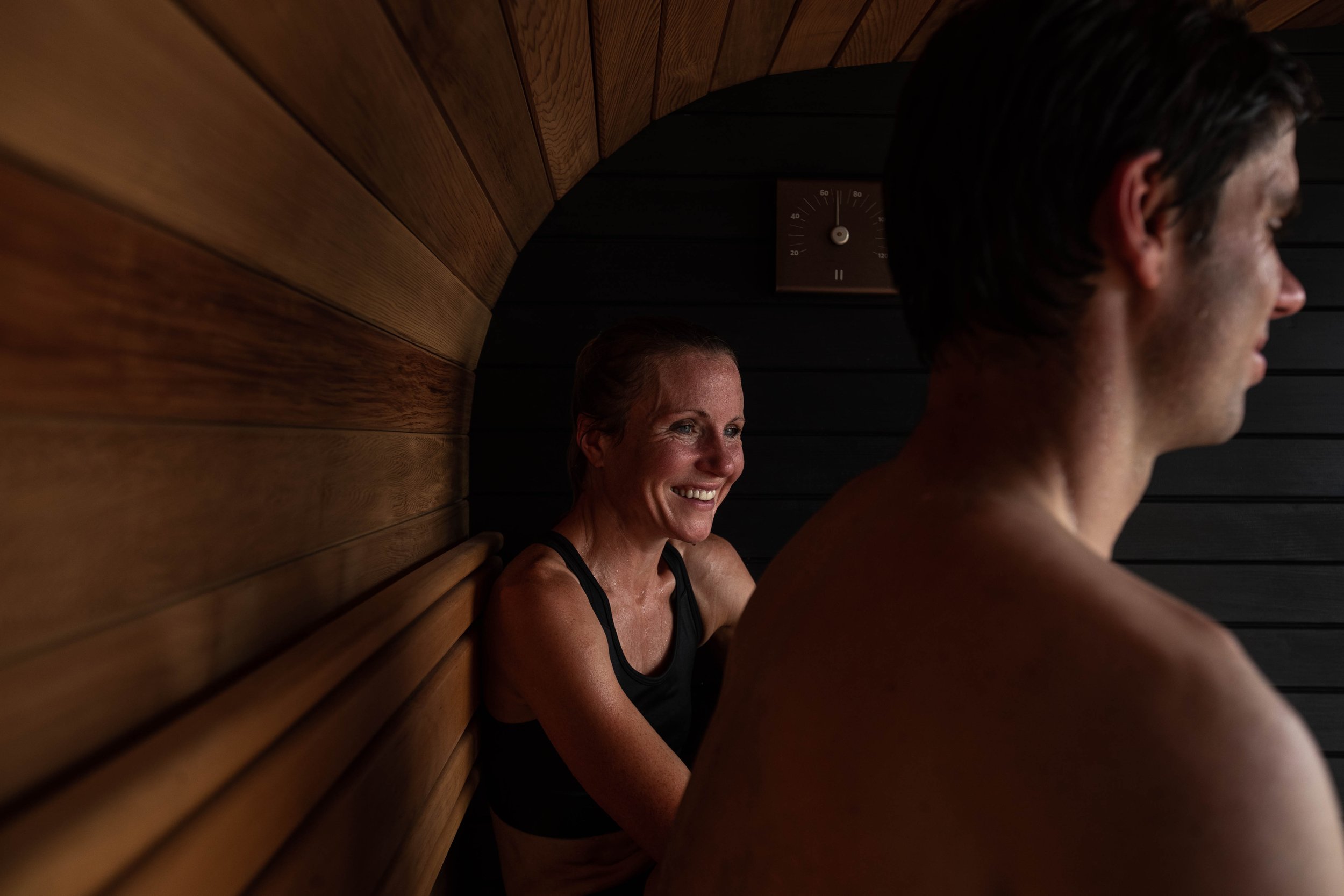The Science of Sauna and Sleep
In the age of information, where it seems every aspect of our well-being is scrutinised and optimised, there’s a quiet but significant shift happening: a growing curiosity about the science of sleep. And for good reason. Research has highlighted the crucial role of sleep in overall health, immune function, mental wellbeing and in both cognitive and athletic performance. Amid the newfound fascination with sleep, unexpected allies in the pursuit of better rest have emerged, one of the most prominent being the use of saunas. A growing pool of research suggests sauna bathing can significantly improve the quality of our sleep. Here, we look at the science of how and why sauna bathing could be the key to sleeping (and living) better…
The Importance of Sleep
In our fast-paced modern lifestyles, where there is often so much focus on productivity, efficiency and generally doing, it can be difficult to prioritise sleep. The constant demands of work, social obligations, and the allure of entertainment in the digital age often lead to sleep being sacrificed. We might find ourselves staying up late to meet deadlines, catch up on emails, or even to enjoy watching our favourite shows, all at the cost of precious sleeping hours.
But sleep is not a luxury; it’s a fundamental necessity. During sleep our bodies engage in vital processes of repair, the consolidation of memories and the removal of toxins from the brain and body. [1] Essentially, sleep is the body’s way of rejuvenating, preparing us to face another day with vigour and clarity. When we consistently cut short our sleep, we compromise not only our physical health, but also our mental and emotional well-being.
Research has shown that chronic sleep deprivation is linked to a myriad of health issues. From weakened immune systems to heightened stress levels, the effects of inadequate sleep can permeate every aspect of our lives.[4] Moreover, lack of sleep impairs cognitive functions such as attention, decision-making, and problem-solving. It also significantly increases the risk of mood disorders and cognitive decline (including Alzheimer's disease) and has even been linked to heart disease and diabetes.[3,2,5]
In essence, sleep isn't merely a state of rest; it's a biological necessity that directly impacts the quality of our waking life. Recognising this is the first step towards understanding why exploring methods to improve our sleep patterns is not just a matter of preference, but a crucial investment in our overall well-being.
Saunas, Thermoregulation and Sleep Hormones
Our ability to fall asleep is closely tied to our body’s core temperature. As part of our circadian rhythm, our internal temperature is regulated throughout the day, and a drop in temperature in the evening (as well as lower light levels) stimulates the production of melatonin (aka ‘the sleep hormone’) in the brain, which in turn triggers the physiological changes that prepare our bodies for sleep. Saunas increase body temperature. However, after using the sauna, the body strives to reduce it’s core temperature to recover, and it is thought that this cooling down period after the sauna mimics the natural drop in temperature that occurs before sleep, and thus triggers the release of melatonin. [6, 7] It’s worth noting here that timing your sauna session in the evening would be the most beneficial - see the tips below.
The presence of melatonin in the bloodstream then helps maintain a deep and restful sleep state, allowing us to progress through different sleep cycles, including Rapid Eye Movement (REM) and deep slow-wave sleep, both of which are essential for quality, restorative sleep.[9]
Although it’s a significant factor, there’s more to a good night’s sleep than adequate melatonin levels, and sauna bathing may actually impact a number of hormones in that play essential roles in quality sleep. As Dr Rhonda Patrick explains,
“Using the sauna [may impact on] the release of ATP, increased adenosine levels and the signalling of sleep-regulating cytokines…. Spending time in the sauna could significantly improve sleep quality - it isn’t just an enticing theory, there’s some scientific evidence supporting this." - Dr Rhonda Patrick [8]
If you’re interested in delving deeper into the complex cellular and molecular mechanisms involved in heat exposure and sleep, check out the video.
Mental Clarity and Reduced Night-time Wakefulness
Aside from the specifics of sleep-inducing hormones, the sauna’s renowned ability to promote relaxation, boost mood and reduce stress can have a notable knock-on effect when it comes to sleep. [6, 10, 11]
As well as triggering the release of feel-good hormones (endorphins), a sauna session provides us with an opportunity to reflect and process our thoughts and feelings, and can act as a powerful tool to promote mindfulness and presence in our bodies. This in turn means our minds become less cluttered or anxious, so we are more likely to find it easier to fall asleep, and to fall back to sleep should we wake briefly during the night.
Furthermore, the sauna serves as a training ground for relaxation responses. By repeatedly exposing ourselves to controlled heat, we condition our bodies and minds to respond calmly to stressors, both within the sauna and in our everyday lives. This ‘training effect’ can translate into a more composed reaction to disturbances during the night, enabling us to swiftly return to restorative sleep.
Sauna Bathing, Pain Management and Sleep Duration
Pain can be a major contributing factor to poor sleep. In 2007, a widespread study found that at least 50% of individuals with insomnia also suffered from chronic pain.[12] It’s perhaps unsurprising that pain can profoundly disrupt sleep cycles, making a night’s rest light and fragmented at best. But according to Sleep Foundation, sleep and pain appear to have a ‘bidirectional relationship’ - meaning that while pain makes getting quality sleep difficult, a getting a full night’s sleep actually alleviates painful symptoms, so for those living with chronic pain, prioritising quality sleep can be a key component in recovery. [13]
In terms of pain management, sauna bathing stands as a scientifically supported intervention, with some studies reporting improvements to muscular and joint pain associated with conditions such as arthritis and fibromyalgia. [6,14]
Thus, it stands to reason that the sauna’s ability to reduce pain and inflammation can have hugely positive consequences for the sleep quality of those who suffer from chronic pain. Even in acute circumstances, sauna bathing to relieve (or even prevent) muscular injury following exercise can help to promote restful sleep.
Sauna Tips for Restful Sleep
If you’re keen to improve the quality of your sleep, we have a few tips to help you make the most of your sauna sessions:
Schedule sauna sessions early in the evening, so you’re allowing time for your body to cool down naturally before bedtime - this gradual decline in body temperature should align with your body’s natural sleep preparation.
Listen to your body to find the temperature that works for you - aim for a comfortable experience that induces relaxation.
Stay hydrated before, during and after your sauna sessions. Adequate hydration supports the body’s cooling mechanisms and helps to ensure optimal physiological responses to heat exposure.
Try mindfulness or relaxation techniques in the sauna, such as deep breathing or meditation.
Embrace the cooldown period after leaving the sauna - it’s part of the experience. Give yourself plenty of time and space to relax and reset, finding a quiet space to do this can be really helpful.
If you can, establish a consistent routine to incorporate sauna sessions into your weekly (or daily) life - making sauna bathing a habit will reap even better rewards.
From hormone regulation to enhanced mental clarity and pain management, the sauna offers a holistic pathway to improved sleep. With the nights drawing in and the benefits of restorative slumber coming to the forefront of scientific research, there’s never been a better time to start prioritising a restful night. Sleep Well.
Sources
National Institute of Neurological Disorders and Stroke (2023) Brain Basics: Understanding Sleep. Accessed: 06/10/2023.
Covassin, N. and Singh, P. (2016) Sleep Duration and Cardiovascular Disease Risk: Epidemiologic and Experimental Evidence. Sleep Med Clin.(1):81-9. DOI: 10.1016/j.jsmc.2015.10.007. Epub 2016 Jan 9. PMID: 26972035; PMCID: PMC4791534.
Wennberg, A.M.V., Wu, M.N., Rosenberg, P.B., and Spira, A.P. (2017) Sleep Disturbance, Cognitive Decline, and Dementia: A Review. Semin Neurol. 37(4):395-406. DOI: 10.1055/s-0037-1604351. Epub 2017
Besedovsky, L., Lange, T., and Haack, M. (2019) The Sleep-Immune Crosstalk in Health and Disease. Physiol Rev., 99(3):1325-1380. DOI: 10.1152/physrev.00010.2018. PMID: 30920354; PMCID: PMC6689741.
Chattu, V. K., Chattu, S.K., Burman, D., Spence, D.W. and Pandi-Perumal, S.R. (2019) The Interlinked Rising Epidemic of Insufficient Sleep and Diabetes Mellitus. Healthcare (Basel). 7(1):37. DOI: 10.3390/healthcare7010037. PMID: 30841553; PMCID: PMC6473416.
Hussain J, Cohen M. (2018) Clinical Effects of Regular Dry Sauna Bathing: A Systematic Review. Evid Based Complement Alternat Med.1857413. DOI: 10.1155/2018/1857413. PMID: 29849692; PMCID: PMC5941775.
DeBara, D. (2023) Sauna and Sleep: A Winning Combo? Oura. [Accessed 06/10/2023].
Patrick, R. (2023) How Heat Therapy Improves Slow Wave Sleep. Youtube Video [Accessed 06/10/2023].
Suni, E. and DeBanto, J. (2022) How Sleep Works: Understanding the Science of Sleep. Sleep Foundation. [Accessed 06/10/2023].
Putkonen PT, Eloma E (1976) Sauna and physiological sleep: Increased slow-wave sleep after heat exposure. In: Teir, Collan, Valyakari (eds) Sauna Studies. The Finnish Sauna Society, Helsinki, pp. 270-279
Janssen, C. W. et al. (2016) Whole-Body Hyperthermia for the Treatment of Major Depressive Disorder: A Randomized Clinical Trial. JAMA Psychiatry. 73(8):789-95. DOI: 10.1001/jamapsychiatry.2016.1031. Erratum in: JAMA Psychiatry. 2016 Aug 1;73(8):878. PMID: 27172277.
Taylor, D.J., et al. (2007) Comorbidity of chronic insomnia with medical problems. Sleep. 30(2):213-8. DOI: 10.1093/sleep/30.2.213. Erratum in: Sleep. 2007 Jul 1;30(7):table of contents. PMID: 17326547.
Pacheco, D. and Rehman, A. (2023) Pain and Sleep. Sleep Foundation [Accessed 06/10/2023].
Cho, E.H. et al. (2019) Dry sauna therapy is beneficial for patients with low back pain. Anesth Pain Med (Seoul). 14(4):474-479. DOI: 10.17085/apm.2019.14.4.474. PMID: 33329780; PMCID: PMC7713799.









